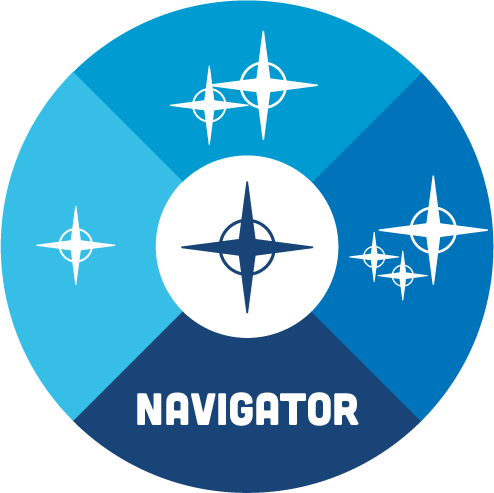
 What are Goals?
What are Goals?
Everyone has goals for themselves. Some are reasonable, while others may be too much to ask for. We expect ourselves to work continuously and score higher grades. We hope to have the same level of energy every day. Also, we expect ourselves to be fearless. Setting clear goals is the most effective method to attain achievable results that are realistic.
You may have a long-term goal in mind, but the best approach to achieve it is to break it down into smaller, more achievable goals. Big goals are more challenging to achieve since they can overwhelm us and appear far away. If you keep chipping away at the goal, little by little, you’ll get there.
Whether you’re trying to accomplish your greatest dream, or just get off the couch, this module will help you to set and achieve your goals.
“You don’t have to be great to start, but you have to start to be great.” — Zig Ziglar

Why Do Goals Matter to Students?
We all know how important it is to set goals. For students, this is a crucial stage because it determines where your energy will be directed. Student life is important because it serves as a stepping stone into one’s profession.
 Your energy must be channeled properly, yet we frequently overlook how vital these gifts are as we go through life.
Your energy must be channeled properly, yet we frequently overlook how vital these gifts are as we go through life.
There are numerous advantages and benefits to having a set of objectives to work toward. Setting objectives aids in the initiation of new behaviours, the direction of your focus, and the maintenance of momentum in life. Goals also aid in instilling a sense of self-worth.
 The Wicked Problem – 0 to 100 by Catherine McDonald
The Wicked Problem – 0 to 100 by Catherine McDonald
A story about finding a balance between academics and social experiences in university.
The Wicked Problem
A huge obstacle for me in learning how to be a successful student was learning to find balance within myself and the academic expectations that were placed on me. Often, I found myself studying for a midterm weeks ahead of time which I realized later was unnecessary but I had no real sense of how it was going to be and I was so afraid of failure that I studied way more than ever before. This over studying did lead to some good grades, I did manage a 98 on that midterm and even got my friends to do really well too. But, my mental health did suffer to a degree. I was isolating myself and staring at my computer screen doing every single assigned reading and making outlines of all of it. Eventually what I found was this wasn’t worth it because ultimately there was no need for me to get such high grades. My scholarship and program required an 80 to maintain them and so there was no real need to be such an overachiever academically with little else going on. Furthermore, it began taking a toll on my mental health. This cycle of studying so hard to achieve led me to very high highs of receiving my mark back and then lows of feeling empty because the grade I received did not really fulfill me and my need to be useful to others.
Finding a Solution
With this realization of these habits negatively affecting my life, I started to branch out and get into less academic sides of school, like different societies, campus wide social and sporting events, parties, mock trials and even academic seminars which had some major appeals. This was especially when compared to time spent cooped up in my room all day working on my academic endeavors. Though this disciplined behaviour can be helpful there is definitely a limit to its usefulness and recognizing that limit is incredibly important. Because the difference between a 98 and a 94 really isn’t much, especially when you studied an extra week alone in your room for it. Now, it also depends on what your goals are but overall it tends not to be a healthy thing to do because typically a lack of balance like that is not conducive to other goals one may have in their life. And as much as it is important to take your grades seriously, there is only a limited amount you can learn from a textbook.
In actuality, experiential learning and getting out there and being in the real world will be what makes you distinct from other students and also what will help those around you and yourself most. Getting involved in your community through collaboration is easier than you might think. Any opportunity you see advertised that interests you, take it. Especially during orientation week there are ads everywhere to be a part of everything. And also don’t forget that many others are desperately looking for people to collaborate with too, hence the adverts so don’t second guess yourself too much. Show up, treat everyone with respect and listen closely, and repeat. Now, although you may not feel your results are as immediate as getting a good grade back I think ultimately you will find that your sense of fulfillment significantly increases by helping others and engaging in your broader community.
A lot of times as well through this interaction with the broader community you may find that models of social behaviour or social theory severely flatten the human experience and the dimensions of people’s stories. In interacting with the social world yourself you come to find many more layers of depth and nuance which can not ever truly be captured with thorough enough detail in textbooks. There’s a sensory experience that goes on in person which is hard to capture through other mediums and is maybe a different reality all in itself. And yes, although it is maybe safer to do things online for a little while longer at least, there is still more interaction in that then online textbook. Basically, what I am overall attempting to say is that it is invaluable to get out there and get all of the social experience you can with people of all different walks of life in order to improve your empathy, your collaboration skills, your generosity and many other positive characteristics. Not to say books and other forms of media cannot be helpful in this process as well, but to me there is definitely a hierarchy of experience I think in terms of what it can provide for character building. Still, in interacting with others it is a better idea to try to go in with minimal expectation and bias. This will typically lead to the most authentic and honest experience.
Another helpful habit I picked up was to study with a friend and bounce ideas back at each other. This met my need of wanting to help others, have some social interaction, but also study. Since then, the friend I do this with is now my best friend and we are going to law school together this September. I could not be more grateful for the opportunities attending university has afforded me in terms of getting involved and forming strong connections with others. The real challenge is just going out there and taking them on.
Final Thoughts
Don’t wait until it’s too late to start living. Take risks while you’re young and don’t be afraid of others because most have more in common with you than you may think.
APA Reference
McDonald, C. (2021, October 6). 0 to 100. Liberated Learners. https://wicked.liberatedlearner.ca/learner/0-to-100/

Activities: Navigate Goals and Expectations Your Way
By the end of these activities, you will be able to identify strategies to support your goals and expectations
- Identify what barriers are causing you to worry or stress
- Develop relevant goals to address your concerns
- Outline strategies to accomplish your goals
Level 1 – Goal Setting Techniques
What can I do to set my own goals?
Task: Write your own short- and long-term SMART goals.
Time commitment:
This activity may take between 30 and 60 minutes to complete.
Steps to Complete
- Begin by watching this video called “Introduction to Setting Goals“. The video comes from a fantastic resource created by Ontario Colleges called The Learning Portal. We will share a number of pieces from The Learning Portal throughout this module. It’s great stuff.
- Continue reading the following sections on writing SMART goals, long-term goals, and short-term goals:
How to write SMART goals
Unclear goals can be difficult to achieve since you may not know HOW to accomplish them. SMART goals take away this confusion.
SMART goals are:
- Specific
- Measurable
- Achievable
- Results-Oriented
- Time-Based
For example:
Unclear goal: “Work out more.”
- This unclear goal is difficult to achieve since you haven’t yet identified how to accomplish it. What does “more” mean to you? What does “work out” mean to you?
SMART goal: “Run 3 kilometres on Monday, Wednesday, and Friday each week to improve my mood, energy, and cardiovascular health.”
- The SMART goal, on the other hand, lays out an action plan. You don’t need to make the decision every day of how to work out, and tracking your progress will be easy since you’ve assigned yourself a timeline and hopeful outcome.
How to set long-term goals
What are long-term goals?
Long-term goals are goals that take a long time to accomplish – perhaps several years, or even decades. Examples of long-term goals are things like becoming a carpenter, learning French, or starting a family. These goals can be intimidating, so it can help to break them down into a series of short-term goals. This can make challenging long-term goals seem more doable.
Take a moment to consider what you really want to do over your lifetime. What do you love doing? What have you always dreamed of doing? Write it down. It’s okay if these goals seem far-off, you have years to achieve them, so make them lofty but reasonable. How do you achieve this goal? One helpful strategy is to work backward, creating short-term goals that will help you to get you closer to these long-term, lifetime goals.
How to set short-term goals
Short-term goals are things that you can accomplish in the near future – maybe in the next year, month, week, day, or hour.
These goals can help you achieve your long-term goals, working as stepping stones to bigger accomplishments.
Sometimes, though, you will have short-term goals that don’t clearly fit into your long-term plans: for example, having a clean apartment. These goals aren’t exciting, but they’re a necessary part of life. When you feel overwhelmed, defeated, or motivated about daily tasks, a to-do list can help you break down these goals and develop an action plan.
Now You Try
Write down a long-term goal for yourself through the “My Goals Map” worksheet . As you write down your ideas, you will be prompted to break your long-term goal down into achievable shorter-term goals. You will end up with a to-do list of things you can do daily or weekly that will help contribute toward your long-term goal.
 Dig Deeper
Dig Deeper
Review the following additional resources for more information:
- Resilience Module from The Learning Portal
Success Checklist
You will know that you have successfully completed this activity when:
- You have identified a current list of larger long-term life goals
- You have identified many different options to break these long-term goals into shorter-term daily, weekly, or monthly tasks
- You are actively completing your daily, weekly, or monthly tasks
Level 2 – Small Rewards for Motivation
How can I motivate myself to achieve my goals?
Task: Consider ways that you can use motivation as a reward for achieving goals.
Time Commitment:
This activity may take between 30 and 60 minutes to complete.
Steps to Complete
Here are the steps you can follow to complete this activity:
- Watch the video “Treat Yourself” to learn how you can use small rewards to increase your motivation. Then, consider the following:
-
-
- There are two types of consequences:
- Immediate consequences: Results of your goal that happen immediately. This can be natural (like when someone claps at your presentation), or a reward that you’ve created for yourself (like a treat after you go to the gym).
- Delayed consequences: Results that may take days, weeks, months, or even years to happen, like graduating from a program. It can be difficult to persist when you aren’t seeing the daily benefits of all your hard work. In fact, studies have shown that immediate consequences are better motivators than delayed consequences.
- If you find that you’re struggling to stay motivated, try tricking your brain by creating some immediate consequences for your goals.
- There are two types of consequences:
-
- Create some strategies for yourself that will bring immediate consequences to your efforts:
-
-
- Buy a fancy coffee and share it with a friend. Take this time to also share your goals and thoughts.
- Take a hike with a friend. The fresh air will immediately feel good and you will be more energized in your day.
- Take a break or do something just for yourself. Give yourself permission to read a novel, go to the movies, get a massage.
- Think of other rewards that are meaningful to you. What would make them motivating? How do they bring value to you?
-
Success Checklist
You will know that you have successfully completed this activity when:
- You are able to identify strategies to help motivate yourself to achieve goals
- You begin to celebrate not just the big achievements but the small daily wins
Level 3 – Self – Reflecting
How can I overcome other barriers in achieving my goals?
Task: You will identify ways of overcoming barriers that you face in your everyday life as you work toward achieving your goals.
Time Commitment:
This activity may take between 30 and 60 minutes to complete.
Steps to Complete:
- Complete the activity called “Navigating Through Barriers” by Algonquin College.
- Complete the accompanying worksheet to help problem-solve, fine-tune or reframe your goals to improve your chances of success.
- Review your responses to the worksheet every time you face that same barrier. Consider:
- Are you taking the steps you said you would to overcome your barrier?
- What parts of your strategy are working well and should be continued?
- What parts of your strategy are not working well and need to be changed?
- Are you stuck and need help? Think of a trusted person you could reach out to. Sometimes just discussing an issue with someone else helps to bring clarity to what the next steps should be.
- Are you facing new barriers? You may wish to complete the worksheet again and identify new motivators to overcome the new barriers.
- If you have overcome a barrier, congratulations! We encourage you to share your experience with friends, family, peers, or others if you feel comfortable doing so. Often, many of us are going through similar experiences and could benefit from the advice and wisdom of others. If you choose to share your experience, think of who would benefit from this information and consider ways you are comfortable sharing. It could be mentioning it in class as a tip for other students, having coffee with a friend and walking them through your steps, or even writing an article for your student council newsletter. However you choose to share, you never know whose life you are changing for the better!
Success Checklist
You will know that you have successfully completed this activity when:
- You have created a clear goal map with steps to achieve the goal(s)
- You have identified what would make your goal achievable
- You have identified ways that you overcome barriers and challenges
- You have reflected on the results of your goal-setting and motivators
- You have considered passing along your words of wisdom to others
Final Words of Wisdom
It is invaluable to get out there and get all of the social experience you can with people of all different walks of life. This will help to improve your empathy, collaboration skills, generosity, and other positive characteristics. Experiential learning through real-world challenges will make you distinct from other students. Your experiences can not only help you grow but may also help those around you. Setting goals for yourself, overcoming barriers, and getting involved in your community can be easier than you might think. Go for it!

